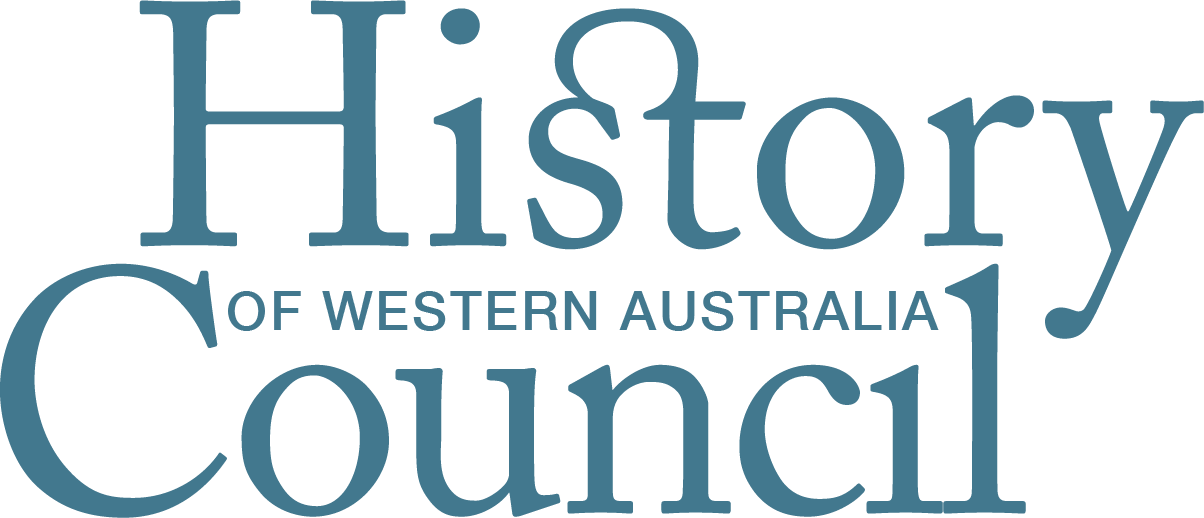History Council of Western Australia Awards 2021
Left to right: Peter Hall (for the Bridgetown Historical Society), Caroline Ingram, Lenore Layman, Jane Lydon (for Rebecca Repper, UWA), Diana Jones (for the WA Museum Boola Bardip), Catherine Baron (Lakeland Senior High School), and Rosinda Seara (History Teachers Association of WA).
The inaugural History Council Awards were presented at the AGM at the State Library of Western Australia on October 27, 2021. The winners are
Lenore Layman
Award for a significant contribution to the understanding or impact of, or advocacy for, the history of Western Australia by an individual or organization.
The judges noted Dr Lenore Layman's outstanding contribution to WA history through her research, teaching, publications and public advocacy and committee work. Her postgraduate public history course at Murdoch University was the first in WA and, under her expert guidance, resulted in many graduates going on to have successful careers. Numerous organisations have benefitted from her knowledge and include the WA History Foundation, the History Council, National Trust of Australia (WA), WA Society for the Study of Labour History, Royal WA Historical Society, Library Board and many others. Lenore is an exemplary scholar, a gifted teacher and an energetic advocate for the value of WA history. These reasons, along with many others, were recognised by the judging panel and we are delighted to award Lenore for her significant contribution to, impact of and advocacy for the history of WA.
Lakeland Senior High School
Award for a significant contribution to the understanding or impact of, or advocacy for, the Indigenous history of Western Australia.
Lakeland Senior High School’s entry was noted for its innovative and respectful contribution to WA’s war history. Believed to be the only such garden in Australia honouring Indigenous women and men, the garden leads to broader discussions about WA Indigenous history. The recognition of Noongar and Mirning people’s service in WWI is supported by an impressive wall display by the HASS students, testimonials and ABC Perth television.
Bridgetown Historical Society
A significant contribution to the understanding local history in Western Australia.
The Bridgetown Police Station Museum is a deserving winner of this award for their initial decision and continued efforts to make a basic, structural change to their practice and collection. The willingness to commence a widely inclusive journey where human rights and the dark history of white settlement in Australia is acknowledged and incorporated is admirable. Their commitment to include First Nations people’s and others in the curation and interpretation is inspirational.
History Teachers’ Association of WA
An outstanding contribution to the teaching of Western Australian history.
As a voluntary organisation, the History Teacher’ Association of WA have been making a significant and important contribution to the professional teaching of Western Australia history for over 20 years. Drawing on the skills and enthusiasm of their members, they have developed resources for teachers and educators that are both practical and inspiring, as well as accessible and interactive. Their web-based resources in particular not only serve to provide the basic needs of teachers and their students, but go beyond this with innovative and lateral thinking in making connections of history with other subjects in the school curriculum to stimulate broader and more diverse conversations. They also present history as not just about the things that happened in the past but about stories and events that are relevant and present in the everyday lives of students today. We hope this award inspires them to continue their good work.
Rebecca Repper
An innovative project, published or unpublished work by an emerging historian.
Rebecca Repper is a PhD student at The University of Western Australia, undertaking historical research within the ARC-funded ‘Collecting the West’ project. Her research analyses collecting approaches to photographic materials and how institutional practices shape understandings of our past. Rebecca’s published and unpublished outcomes include journal articles, blogs, and conference papers. Her recently published paper, ‘Foundational Photographs’, reveals the interaction of Western Australia’s early Museum and Art Gallery with ‘global social, intellectual and administrative centres’, innovatively contributing to understandings of our important cultural organisations and their histories. Furthermore, her work demonstrates the ‘value of the photograph’ in shaping modern practices within our early collecting institutions, at a time when those collections were geographically removed from centres of western and British society.
Caroline Ingram
An innovative contribution to understandings of Western Australian history, or its advocacy, by a student or students.
Caroline Ingram is a PhD student at the University of Western Australia who, in 2019, published the article “Constructing Gender in the Press: The Case of Audrey Jacob,” (Law & History, 6, no.1 (2019): 58–84). The paper argued that, contrary to claims within existing scholarship, honour killings had occurred in Australia and had—at least in the case of Audrey Campbell Jacob—won full acquittal. Secondly, the paper demonstrated that his lawyer, Arthur Haynes, successfully manipulated media reports to present Jacob as a victim. Ingram has since demonstrated innovative approaches to the dissemination and continued use of her findings, which have been used by others in radio interviews, online news reports, university teaching and, most recently, in the production of a Screenwest documentary.
Western Australian Museum Boola Bardip
Special award
Boola Bardip is an outstanding and unique contribution to the social, cultural, political, Indigenous and other histories of Western Australia that will have enduring and long-lasting impact, will contribute to new understandings of our history and heritage, and which advocates for the history of present and future generations.

